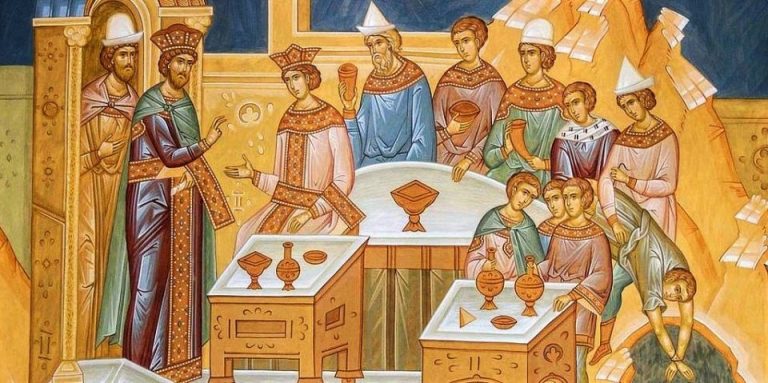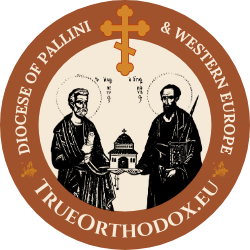Fourteenth Sunday after Pentecost- Parable of the Wedding Feast

Sermon by Archbishop Andrew Rymarenko
“So those servants went out into the highways, and gathered together all as many as they found, both bad and good: and the wedding was furnished with guests. And when the king came in to see the guests, he saw there a man which had not on a wedding garment: and he saith unto him, Friend, how earnest thou in hither not having a wedding garment? And he was speechless. Then said the king to the servants, Bind him hand and foot, and take him away, and cast him into outer darkness; there shall be weeping and gnashing of teeth” (Mt. 22:10-13).
Such a Gospel the Holy Church offers today for our attention: the Gospel about the wedding feast. And here is the section which refers to both the good and the evil ones who gathered at the meal. And when the lord entered, he found one man who was not dressed in a wedding garment. And just for this, that he was not wearing a wedding garment, such a terrible punishment followed. He was thrown out, bound, and was cast into a place of fire. For us this may even be incomprehensible. What is this actually? God is merciful, compassionate, and suddenly such a terrible punishment. Here is something we must understand. Let us look at it. If you remember, brothers, the Gospel which was read Sunday before last, you will recall also the pious young man who approached the Lord and asked Him what to do in order to enter the Kingdom of God. The Lord said, Fulfill the commandments. He said that he had fulfilled them. But seeing his heart, the Lord said: Give away everything you possess and follow me (Mt. 19:16-21).
The Lord called the young man to follow Him, but this young man was rich. And he trusted in these earthly riches, in the things that surround us. He somehow didn’t understand that this very night his soul might be taken away and pass into eternal life. And what did he go away with? The Lord called him for renewal, to remove from his heart all the scabs, which are human passions. The Lord called. But he had riches which made him think that this earth is ours and is the purpose of our life. This is all we have: our houses, our villas, our cars, our relationships with each other. And we don’t notice that one after another we depart. So this means that the Gospel of the Sunday before last is pointing out: do not trust, do not persist in your strivings for possession of earthly things, because this very night eternity may open for us. The earth is given to us only as a means of receiving those things which should be in a man’s soul. And our soul should be suffused, as if saturated with the Beatitudes.
And this past Sunday. In the Gospel reading it told about the vineyard workers. The lord created the vineyard, gave them livelihood for their work. This livelihood consisted of everything that was needed for their life. But they, like the young man, accepted in their heart that this vineyard was their riches, that it belonged to them. This very vineyard, which was serving only as a means of acquiring goodness of heart, became for them an object of temptation. They decided to use it as their own. And therefore, they drove off all symptoms that were telling them that, after all, this was not theirs, that it belonged to the Lord; and you have to do what the Lord requires of you: cultivate the vineyard. Then you will receive in your heart that goodness with which you can depart from this vineyard and go to something much better and greater, to something which God has prepared for you. But they did not pay attention to these symptoms. The vineyard became for them such a temptation, as the earth is for us, in which we seem to have everything we need. On it we build our villas, and close by are lying Lazaruses — beggars, widows, unfortunate children who have to be raised. But we do not concern ourselves with them. We are busy with our fine clothes, our meals, with such matters that will remain here. And the person departs into eternal life hungry, without good deeds.
Now that we have analyzed these two Gospels, we ask: Why did the Lord tell this parable, and why does the Holy Church offer it today for our attention? Everyone who knows the Gospel knows also that, in addition to the Evangelist Matthew whose Gospel was read today, the Evangelist Luke also refers to this parable in some detail (Lk. 14:15-24). It tells there how Christ was invited to the meal of Simon the Pharisee. At this meal Christ saw what the Jews did who accepted the law of Moses, how they changed the law of Moses into a means of their own greatness and pride. And Christ, seeing this and feeling sorry for Simon who had invited Him, started to teach him. This was heard by all who were present at the meal. And they were supposedly right-believing Jews, Pharisees of Pharisees. And when Christ began to speak, He was for them…who was He? Just a rabbi. Here one of the Jews could not contain himself. And when Christ said that people will receive for their good deeds the Kingdom of God, he exclaimed, “Blessed is He that shall eat bread in the Kingdom of God!” (Lk.14:15). Blessed! Because this blessedness belongs to the children of Abraham; what you are talking about belongs to us. Why bother with good deeds? The promise which was given to Moses is ours and we are using it — we, the Jews. This is our kingdom.
Then Christ, answering about this “kingdom,” gave them this parable. Here He pointed out that the Jews were called by God for such a long time to receive blessedness, were called to a pure life; but they did not come. They were busy in the same way as that young man, as the workers in the vineyard — with earthly things. Apparently they were building for themselves palaces, buying unfortunate slaves, living in comfort, and they had no concern for anything else. And therefore, why bother with a king’s feast? So their response to this feast was such that almost everyone refused to come. Then the Lord called his soldiers and through the soldiers called everyone, both evil and good, without discrimination: everyone had to come.
In the East when a feast was given, not only was food presented but also raiment. In this way, when garments were given to those who came — harlots, tax collectors, and other sinners — everyone was given an equal garment. But among them was also a Pharisee who entered. What he saw seemed horrible to him. Among those who were invited were great sinners, harlots, and tax collectors. He did not want to be on a level with them. His own garment, as it appeared to him, was much better. And he remained in it. The king entered to look at the guests and said to him: “Friend, how earnest thou in hither not having a wedding garment? And he was speechless” (Mt. 22:12). But in his soul one could imagine that he was rebelling. Rebelling, because those present at the wedding feast were all sinners. And he, as it seemed a righteous man, a son of Abraham, here he had to sit together with them. And the most degrading thing of all was that they wanted him to exchange his rich garment for the garment in which all the sinners were dressed, for this wedding garment. No.. .never.
So what happened — happened! The Lord ordered him to be bound for disrupting unity. What unity? The unity of the Church of Christ.
See, brothers and sisters, how important this unity is, how precious the Church of Christ is in the eyes of the Lord.
So let us obey the voice of the Church; let us fulfill with our whole soul whatever she requires of us; let us keep the garment which she has given us. And may it never happen to us what happened to him, who was not wearing a wedding garment.





